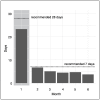Adherence to Hunger Training over 6 Months and the Effect on Weight and Eating Behaviour: Secondary Analysis of a Randomised Controlled Trial
- PMID: 29149038
- PMCID: PMC5707732
- DOI: 10.3390/nu9111260
Adherence to Hunger Training over 6 Months and the Effect on Weight and Eating Behaviour: Secondary Analysis of a Randomised Controlled Trial
Abstract
Monitoring blood glucose prior to eating can teach individuals to eat only when truly hungry, but how adherence to 'hunger training' influences weight loss and eating behaviour is uncertain. This exploratory, secondary analysis from a larger randomized controlled trial examined five indices of adherence to 'hunger training', chosen a priori, to examine which adherence measure best predicted weight loss over 6 months. We subsequently explored how the best measure of adherence influenced eating behavior in terms of intuitive and emotional eating. Retention was 72% (n = 36/50) at 6 months. Frequency of hunger training booklet entry most strongly predicted weight loss, followed by frequency of blood glucose measurements. Participants who completed at least 60 days of booklet entry (of recommended 63 days) lost 6.8 kg (95% CI: 2.6, 11.0; p < 0.001) more weight than those who completed fewer days. They also had significantly higher intuitive eating scores than those who completed 30 days or less of booklet entry; a difference (95% CI) of 0.73 (0.12, 1.35) in body-food choice congruence and 0.79 (0.06, 1.51) for eating for physical rather than emotional reasons. Adherent participants also reported significantly lower scores for emotional eating of -0.70 (-1.13, -0.27). Following hunger training and focusing on simply recording ratings of hunger on a regular basis can produce clinically significant weight loss and clinically relevant improvements in eating behaviour.
Keywords: adherence; blood glucose self-monitoring; food intake regulation; hunger; obesity.
Conflict of interest statement
The authors declare no conflict of interest.
Figures


Similar articles
-
'Am I really hungry?' A qualitative exploration of patients' experience, adherence and behaviour change during hunger training: a pilot study.BMJ Open. 2019 Dec 31;9(12):e032248. doi: 10.1136/bmjopen-2019-032248. BMJ Open. 2019. PMID: 31892654 Free PMC article. Clinical Trial.
-
Teaching people to eat according to appetite - Does the method of glucose measurement matter?Appetite. 2020 Aug 1;151:104691. doi: 10.1016/j.appet.2020.104691. Epub 2020 Apr 1. Appetite. 2020. PMID: 32246953 Clinical Trial.
-
Effects of manipulating eating frequency during a behavioral weight loss intervention: a pilot randomized controlled trial.Obesity (Silver Spring). 2012 May;20(5):985-92. doi: 10.1038/oby.2011.360. Epub 2011 Dec 15. Obesity (Silver Spring). 2012. PMID: 22173575 Clinical Trial.
-
[Assessing various aspects of the motivation to eat that can affect food intake and body weight control].Encephale. 2009 Apr;35(2):182-5. doi: 10.1016/j.encep.2008.03.009. Epub 2008 Jul 7. Encephale. 2009. PMID: 19393389 Review. French.
-
Relationships between intuitive eating and health indicators: literature review.Public Health Nutr. 2014 Aug;17(8):1757-66. doi: 10.1017/S1368980013002139. Epub 2013 Aug 21. Public Health Nutr. 2014. PMID: 23962472 Free PMC article. Review.
Cited by
-
Effects of health at every size based interventions on health-related outcomes and body mass, in a short and a long term.Front Nutr. 2024 Oct 8;11:1482854. doi: 10.3389/fnut.2024.1482854. eCollection 2024. Front Nutr. 2024. PMID: 39439526 Free PMC article. Review.
-
'Am I really hungry?' A qualitative exploration of patients' experience, adherence and behaviour change during hunger training: a pilot study.BMJ Open. 2019 Dec 31;9(12):e032248. doi: 10.1136/bmjopen-2019-032248. BMJ Open. 2019. PMID: 31892654 Free PMC article. Clinical Trial.
-
Exploring the Impact of Dawn Phenomenon on Glucose-Guided Eating Thresholds in Individuals With Type 2 Diabetes Using Continuous Glucose Monitoring: Observational Study.JMIR Form Res. 2023 Aug 11;7:e46034. doi: 10.2196/46034. JMIR Form Res. 2023. PMID: 37566445 Free PMC article.
-
Effect of Energy Restriction on Eating Behavior Traits and Psychobehavioral Factors in the Low Satiety Phenotype.Nutrients. 2019 Jan 22;11(2):245. doi: 10.3390/nu11020245. Nutrients. 2019. PMID: 30678317 Free PMC article.
-
Hunger Training as a Self-regulation Strategy in a Comprehensive Weight Loss Program for Breast Cancer Prevention: A Randomized Feasibility Study.Cancer Prev Res (Phila). 2022 Mar 1;15(3):193-201. doi: 10.1158/1940-6207.CAPR-21-0298. Cancer Prev Res (Phila). 2022. PMID: 34893531 Free PMC article. Clinical Trial.
References
-
- Baños R.M., Cebolla A., Moragrega I., Van Strien T., Fernández-Aranda F., Agüera Z., de la Torre R., Casanueva F.F., Fernández-Real J.M., Fernández-García J.C., et al. Relationship between eating styles and temperament in an Anorexia Nervosa, Healthy Control, and Morbid Obesity female sample. Appetite. 2014;76:76–83. doi: 10.1016/j.appet.2014.01.012. - DOI - PubMed
Publication types
MeSH terms
LinkOut - more resources
Full Text Sources
Other Literature Sources
Medical

